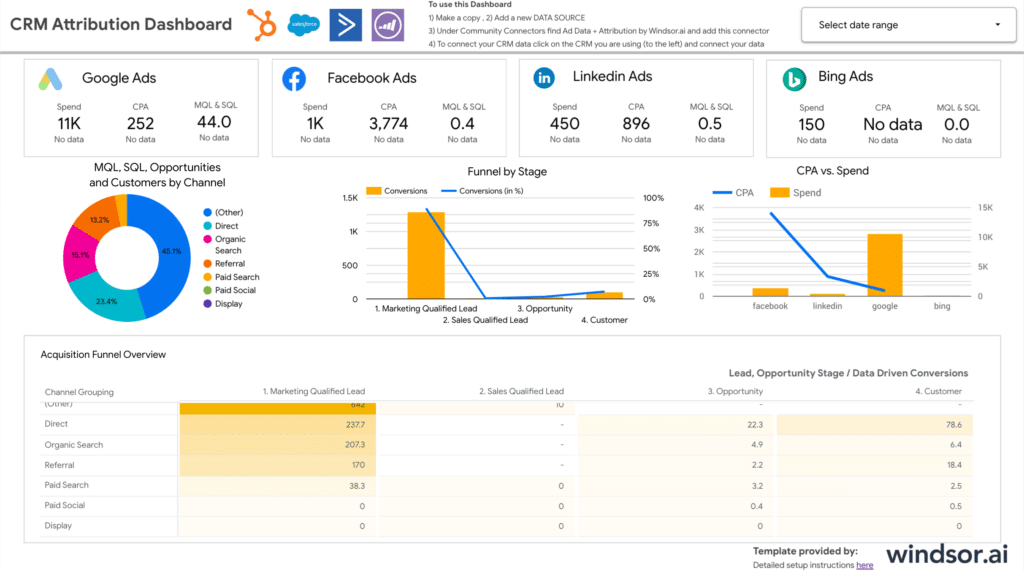Unlocking Growth: How CRM Powers Exceptional Marketing Performance

Introduction: The CRM Revolution in Marketing
In the ever-evolving landscape of digital marketing, staying ahead of the curve requires more than just clever campaigns and catchy slogans. It demands a deep understanding of your audience, personalized interactions, and a seamless flow of information. This is where Customer Relationship Management (CRM) systems step in, revolutionizing how businesses approach marketing and driving unprecedented performance. Forget the days of disconnected data silos and generic blasts; CRM empowers marketers to connect with customers on a deeper level, fostering loyalty and fueling growth.
This article delves into the profound impact of CRM on marketing performance. We’ll explore how CRM systems enhance every stage of the marketing funnel, from lead generation to customer retention. We’ll uncover the key features and functionalities that make CRM an indispensable tool for modern marketers, and we’ll provide practical insights and strategies for maximizing its potential. Whether you’re a seasoned marketing professional or just starting to explore the possibilities of CRM, this guide will equip you with the knowledge and tools you need to transform your marketing efforts and achieve remarkable results.
Understanding the Core Principles of CRM in Marketing
At its heart, CRM is about building and nurturing relationships. It’s a strategic approach to managing all your interactions with current and potential customers, with the ultimate goal of increasing customer lifetime value and driving business growth. In the context of marketing, CRM serves as the central nervous system, connecting various data points and providing a holistic view of each customer.
Key Principles:
- Customer-Centricity: CRM places the customer at the center of all marketing activities. It emphasizes understanding their needs, preferences, and behaviors to deliver relevant and personalized experiences.
- Data-Driven Decisions: CRM relies on data to inform marketing strategies. It provides insights into customer segments, campaign performance, and overall marketing effectiveness, enabling data-driven decision-making.
- Personalization: CRM allows marketers to tailor their messaging and offers to individual customers based on their specific profiles and past interactions. This personalization enhances engagement and increases conversion rates.
- Automation: CRM automates repetitive marketing tasks, such as email campaigns, lead nurturing, and social media posting, freeing up marketers to focus on more strategic initiatives.
- Integration: CRM integrates with other business systems, such as sales, customer service, and e-commerce platforms, to provide a unified view of the customer journey.
By adhering to these core principles, marketers can leverage CRM to create more effective campaigns, improve customer satisfaction, and ultimately drive significant improvements in marketing performance.
The Benefits of CRM for Marketing Performance
The advantages of implementing a robust CRM system in your marketing strategy are numerous and far-reaching. It’s no longer a luxury but a necessity for businesses aiming to thrive in today’s competitive market. Let’s explore some of the key benefits:
Enhanced Lead Generation and Management
CRM streamlines the lead generation process by capturing and organizing lead information from various sources, such as website forms, social media, and marketing campaigns. This centralized data allows marketers to:
- Qualify Leads: Identify leads that are most likely to convert into customers based on their demographics, behaviors, and engagement levels.
- Segment Leads: Group leads into distinct segments based on their characteristics and interests, enabling targeted marketing efforts.
- Nurture Leads: Develop automated lead nurturing campaigns that provide valuable information and guide leads through the sales funnel.
- Track Lead Sources: Identify which marketing channels are generating the most qualified leads, allowing for optimized resource allocation.
Improved Campaign Effectiveness
CRM provides valuable insights into campaign performance, enabling marketers to optimize their strategies for maximum impact. Key features include:
- Campaign Tracking: Monitor the performance of individual campaigns, including email open rates, click-through rates, and conversion rates.
- A/B Testing: Conduct A/B tests to compare different versions of marketing materials and identify the most effective messaging and offers.
- Personalized Campaigns: Create personalized campaigns that target specific customer segments with tailored content and offers.
- Real-time Reporting: Access real-time data on campaign performance, allowing for immediate adjustments and optimization.
Increased Customer Engagement and Loyalty
CRM facilitates personalized interactions and proactive customer service, leading to increased engagement and loyalty. Key functionalities include:
- 360-Degree Customer View: Gain a comprehensive view of each customer, including their purchase history, communication interactions, and preferences.
- Personalized Communication: Send personalized emails, offers, and recommendations based on individual customer profiles.
- Proactive Customer Service: Anticipate customer needs and provide proactive support, such as automated follow-up emails and personalized recommendations.
- Loyalty Programs: Implement loyalty programs that reward repeat customers and encourage long-term engagement.
Streamlined Sales and Marketing Alignment
CRM fosters collaboration between sales and marketing teams, ensuring a seamless customer experience. Key benefits include:
- Lead Handoff: Automatically transfer qualified leads from marketing to sales, ensuring timely follow-up.
- Shared Data: Provide sales teams with access to marketing data, such as lead scoring and campaign engagement, to personalize their interactions.
- Closed-Loop Reporting: Track the entire customer journey from lead generation to conversion, providing insights into the effectiveness of both sales and marketing efforts.
- Common Goals: Align sales and marketing teams around common goals, such as revenue generation and customer satisfaction.
Data-Driven Decision Making
CRM provides a wealth of data that can be used to make informed decisions about marketing strategies and resource allocation. Key data points include:
- Customer Segmentation: Identify distinct customer segments based on their characteristics and behaviors.
- Campaign Performance: Track the performance of individual campaigns and identify areas for improvement.
- Customer Lifetime Value (CLTV): Calculate the estimated revenue generated by each customer over their lifetime.
- Return on Investment (ROI): Measure the ROI of marketing campaigns and identify the most profitable channels.
Essential CRM Features for Marketing Success
Not all CRM systems are created equal. To maximize marketing performance, it’s crucial to choose a CRM that offers the essential features and functionalities that meet your specific needs. Here’s a breakdown of key features:
Lead Management
This is the foundation of any effective marketing CRM. Lead management features allow you to:
- Capture Leads: Integrate with website forms, landing pages, and other lead generation tools to capture lead information automatically.
- Lead Scoring: Assign scores to leads based on their engagement and demographics to prioritize the most promising prospects.
- Lead Routing: Automatically assign leads to the appropriate sales representatives based on predefined rules.
- Lead Nurturing: Create automated email sequences and workflows to nurture leads through the sales funnel.
Contact Management
Contact management features allow you to store and manage all customer and prospect information in a centralized database. This includes:
- Contact Profiles: Store detailed information about each contact, including their contact details, demographics, and purchase history.
- Segmentation: Segment contacts based on various criteria, such as demographics, behaviors, and engagement levels.
- Interaction Tracking: Track all interactions with contacts, including emails, calls, and meetings.
- Notes and Activities: Add notes and activities to contact profiles to document all interactions and communications.
Campaign Management
Campaign management features enable you to plan, execute, and track marketing campaigns effectively. This includes:
- Email Marketing: Create and send targeted email campaigns with personalized messaging and offers.
- Social Media Integration: Integrate with social media platforms to manage your social media presence and track engagement.
- Landing Page Creation: Create landing pages to capture leads and promote your products and services.
- Workflow Automation: Automate repetitive tasks, such as email sends and lead nurturing, to save time and improve efficiency.
Analytics and Reporting
Robust analytics and reporting features are essential for measuring the success of your marketing efforts. This includes:
- Dashboarding: Create custom dashboards to visualize key marketing metrics and track performance in real-time.
- Reporting: Generate detailed reports on campaign performance, lead generation, and customer engagement.
- Data Analysis: Analyze data to identify trends, patterns, and insights that can inform your marketing strategies.
- ROI Tracking: Measure the return on investment of your marketing campaigns to optimize resource allocation.
Integration Capabilities
To maximize the effectiveness of your CRM, it should integrate seamlessly with other business systems. Key integrations include:
- Email Marketing Platforms: Integrate with email marketing platforms to automate email campaigns and track performance.
- Social Media Platforms: Integrate with social media platforms to manage your social media presence and track engagement.
- E-commerce Platforms: Integrate with e-commerce platforms to track customer purchases and personalize recommendations.
- Sales Automation Tools: Integrate with sales automation tools to streamline the lead handoff process and improve sales efficiency.
Implementing a CRM System: A Step-by-Step Guide
Implementing a CRM system can seem daunting, but with a well-defined plan, you can ensure a smooth transition and maximize its benefits. Here’s a step-by-step guide:
1. Define Your Goals and Objectives
Before you begin, clearly define your goals and objectives for implementing a CRM system. What specific marketing challenges are you trying to solve? What do you hope to achieve?
- Increase lead generation.
- Improve campaign effectiveness.
- Enhance customer engagement.
- Streamline sales and marketing alignment.
- Improve data-driven decision making.
2. Assess Your Needs and Requirements
Evaluate your current marketing processes and identify your specific needs and requirements. Consider the following:
- Team Size: How many users will need access to the CRM?
- Budget: What is your budget for the CRM system?
- Features: What features are essential for your marketing efforts?
- Integrations: What integrations are required to connect the CRM with other systems?
- Scalability: Will the CRM system be able to scale as your business grows?
3. Research and Select a CRM System
Research different CRM systems and compare their features, pricing, and reviews. Consider the following:
- Ease of Use: Is the CRM system user-friendly and easy to navigate?
- Customization Options: Can you customize the CRM system to meet your specific needs?
- Support and Training: Does the vendor offer adequate support and training?
- Pricing: Is the pricing model transparent and affordable?
- Reviews and Ratings: Read reviews and ratings from other users to get an idea of the CRM system’s strengths and weaknesses.
4. Plan Your Implementation
Create a detailed implementation plan that outlines the steps involved in setting up the CRM system. This includes:
- Data Migration: Plan how you will migrate your existing data into the CRM system.
- User Training: Train your team on how to use the CRM system.
- Workflow Configuration: Configure workflows to automate marketing tasks.
- Integration Setup: Set up integrations with other business systems.
- Testing: Test the CRM system to ensure that it is functioning correctly.
5. Migrate Your Data
Migrate your existing data into the CRM system. Ensure that your data is accurate and organized.
- Cleanse Your Data: Remove duplicate records and correct any errors.
- Import Your Data: Import your data into the CRM system using the appropriate import tools.
- Verify Your Data: Verify that your data has been imported correctly.
6. Train Your Team
Provide comprehensive training to your team on how to use the CRM system. Make sure all users understand how to utilize the system’s features and functionalities effectively.
- Provide Training Materials: Provide training materials, such as user manuals and video tutorials.
- Conduct Training Sessions: Conduct training sessions to train your team on how to use the CRM system.
- Provide Ongoing Support: Provide ongoing support to your team to answer any questions and resolve any issues.
7. Configure Workflows and Automations
Configure workflows and automations to streamline your marketing processes. Automate repetitive tasks to save time and improve efficiency.
- Set Up Lead Routing: Set up rules to automatically route leads to the appropriate sales representatives.
- Create Email Automation: Create automated email sequences to nurture leads and engage customers.
- Automate Task Management: Automate task management to ensure that tasks are completed on time.
8. Integrate with Other Systems
Integrate your CRM system with other business systems, such as email marketing platforms, social media platforms, and e-commerce platforms. This will provide a unified view of your customer data and improve efficiency.
- Integrate with Email Marketing Platforms: Integrate with your email marketing platform to automate email campaigns.
- Integrate with Social Media Platforms: Integrate with your social media platforms to manage your social media presence.
- Integrate with E-commerce Platforms: Integrate with your e-commerce platform to track customer purchases.
9. Monitor and Optimize
Continuously monitor the performance of your CRM system and make adjustments as needed. Track key metrics and analyze data to identify areas for improvement.
- Track Key Metrics: Track key metrics, such as lead generation, campaign performance, and customer engagement.
- Analyze Data: Analyze data to identify trends, patterns, and insights.
- Make Adjustments: Make adjustments to your CRM system and marketing strategies based on your findings.
Best Practices for Maximizing CRM Marketing Performance
Implementing a CRM system is just the first step. To truly unlock its potential, it’s essential to follow best practices that will help you optimize your marketing performance. Here are some key strategies:
1. Focus on Data Quality
The success of your CRM system hinges on the quality of your data. Ensure that your data is accurate, complete, and up-to-date. Implement processes to cleanse and validate your data regularly.
- Regular Data Cleansing: Cleanse your data regularly to remove duplicate records and correct any errors.
- Data Validation: Implement data validation rules to ensure that new data is accurate and complete.
- Data Enrichment: Enrich your data with additional information from third-party sources.
2. Personalize Your Communications
Leverage the data stored in your CRM system to personalize your communications. Tailor your messaging and offers to individual customers based on their preferences, behaviors, and past interactions.
- Segment Your Audience: Segment your audience based on various criteria, such as demographics, behaviors, and engagement levels.
- Create Personalized Email Campaigns: Create personalized email campaigns that target specific customer segments.
- Use Dynamic Content: Use dynamic content to personalize your website and landing pages.
3. Automate Your Marketing Processes
Automate repetitive marketing tasks to save time and improve efficiency. Automate lead nurturing, email campaigns, and social media posting.
- Automate Lead Nurturing: Create automated email sequences to nurture leads through the sales funnel.
- Automate Email Campaigns: Automate email campaigns to send targeted messages to specific customer segments.
- Automate Social Media Posting: Automate social media posting to schedule posts and track engagement.
4. Integrate Your CRM with Other Systems
Integrate your CRM system with other business systems, such as email marketing platforms, social media platforms, and e-commerce platforms. This will provide a unified view of your customer data and improve efficiency.
- Integrate with Email Marketing Platforms: Integrate with your email marketing platform to automate email campaigns and track performance.
- Integrate with Social Media Platforms: Integrate with your social media platforms to manage your social media presence and track engagement.
- Integrate with E-commerce Platforms: Integrate with your e-commerce platform to track customer purchases.
5. Track and Analyze Your Results
Continuously track and analyze the results of your marketing efforts. Monitor key metrics and use data to identify areas for improvement.
- Track Key Metrics: Track key metrics, such as lead generation, campaign performance, and customer engagement.
- Analyze Data: Analyze data to identify trends, patterns, and insights.
- Make Adjustments: Make adjustments to your marketing strategies based on your findings.
6. Train and Empower Your Team
Provide your team with adequate training and support to ensure that they can effectively use the CRM system. Empower your team to make data-driven decisions and optimize their marketing efforts.
- Provide Training Materials: Provide training materials, such as user manuals and video tutorials.
- Conduct Training Sessions: Conduct training sessions to train your team on how to use the CRM system.
- Provide Ongoing Support: Provide ongoing support to your team to answer any questions and resolve any issues.
Real-World Examples of CRM Marketing Success
The power of CRM in marketing isn’t just theoretical; it’s been proven time and again in the real world. Here are a few examples of how businesses have leveraged CRM to achieve remarkable marketing success:
Example 1: Retail Company X
Retail Company X implemented a CRM system to personalize its marketing efforts. By analyzing customer purchase history and browsing behavior, the company was able to:
- Create Targeted Email Campaigns: Send personalized emails with product recommendations based on individual customer preferences.
- Increase Customer Lifetime Value: Increase customer lifetime value by providing relevant offers and promotions.
- Improve Conversion Rates: Improve conversion rates by tailoring the website experience to individual customer needs.
The results were impressive: a 20% increase in sales within the first year of implementation.
Example 2: SaaS Company Y
SaaS Company Y used a CRM system to streamline its lead generation and nurturing processes. They implemented automated lead scoring and lead routing to:
- Improve Lead Qualification: Improve lead qualification by identifying the leads that were most likely to convert.
- Accelerate Sales Cycles: Accelerate sales cycles by nurturing leads through the sales funnel.
- Reduce Costs: Reduce costs by automating repetitive tasks.
The impact was significant: a 30% increase in qualified leads and a 15% reduction in sales cycle time.
Example 3: Manufacturing Company Z
Manufacturing Company Z integrated its CRM with its customer service platform to improve customer satisfaction. By having a 360-degree view of each customer, they were able to:
- Provide Proactive Customer Service: Provide proactive customer service by anticipating customer needs.
- Increase Customer Retention: Increase customer retention by resolving issues quickly and efficiently.
- Enhance Brand Reputation: Enhance brand reputation by providing excellent customer service.
The results were positive: a 10% increase in customer satisfaction and a 5% increase in customer retention.
Conclusion: The Future of Marketing is CRM-Driven
In conclusion, CRM is no longer just a tool; it’s the foundation of effective marketing in the modern era. By implementing a robust CRM system and following best practices, businesses can transform their marketing efforts, improve customer engagement, and drive significant growth. From enhanced lead generation to personalized campaigns and streamlined sales and marketing alignment, CRM empowers marketers to connect with their customers on a deeper level and achieve remarkable results.
The future of marketing is undoubtedly CRM-driven. As technology continues to evolve, CRM systems will become even more sophisticated, providing marketers with unprecedented insights and capabilities. Businesses that embrace CRM will be well-positioned to thrive in the competitive landscape, while those that lag behind risk falling behind the curve. Now is the time to embrace the power of CRM and unlock the full potential of your marketing performance.




